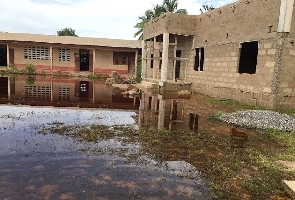The Chiefs and people of Klikor and Agbozume in the Ketu South Municipality of the Volta region, are calling for efforts to find a permanent solution to the perennial flooding situation in the area.
Their calls came in the wake of recent heavy rains in the enclave that left hundreds of homes in and around Klikor and Agbozume under flood waters.
The situation has brought businesses to a standstill, leading to the temporary halt in economic activities like Kete/Kente weaving, farming, and fishing, as many of the local folks are put under personal restriction in their respective homes unable to go out, a situation which is taking a toll on their livelihoods.
Footpaths leading to the market and the Agbozume township were heavily flooded, making the already deplorable area unmotorable.
Areas severely affected by the floods were under the Klikor traditional area and included Shieme, Apegame, Shietorkope, Tsavanya, Kpordoave, and parts of Klikor Central.
The rest are Elokorpe, Logove, Agudzakope, Sukladzi, Amukoe, Ahorkpey Dzisakope, Dawukope, and parts of Amefinukope/Atsiwuta.
Many people in these affected areas are full of anxiety as they anticipate more rains in the coming days, especially this June.
Some teachers at National, Wisdom and Sukladzi Basic Schools, told this reporter that "we have had to take off our shoes and walk through the flood waters with our trousers folded to get to our schools each day - most of our learners have also refused to come to school as a result of the effect of the flooding."
Currently, the Ketu South section of the Keta lagoon basin and other lagoons and small rivers surrounding the two traditional areas, Some/Klikor, have started experiencing an overflow, threatening the residents along the banks.
Torgbi Korkudjaah-Boafo Tamakloe II, a Dvisional Chief of Kpordoave and Tsavanya, two of the badly hit communities explained to this reporter that the situation was perennial and occured every rainy season affecting especially low lying communities.
He said: "What needed to be done is to find a permanent and lasting solution to the problem - we cannot always wait for this annual phenomenon to happen then all we do is to find interim solutions and then go to sleep till the following season when it reoccurs."
Torgbi Tamakloe said on his own as the Protocol Officer of the Klikor traditional area, he had been in talks with his partners, a Belgian construction company who have promised to come to the aid of the community by helping to build proper drainage systems which will go a long way to prevent the flooding of the communities during heavy downpours.
He called for collaborative efforts from all well-meaning citizens of the affected communities, companies and organizations operating within the enclave and benevolent institutions to support efforts aimed at finding a permanent solution to the problem.
Daniel Jerry Sorokpo a teacher and concerned citizen of the area told this reporter that it was disheartening to see government officials and key stakeholders remain unconcerned and continue to remain silent over the problem.
He said he has on his own as a concerned citizen begun the process of reaching out to philanthropists at home and abroad for support after meeting some opinion leaders from the area recently, in a bid to ensure that the problem was addressed promptly "so that our children can return to and remain in school - because as it stands now many of them are absenting themselves from school and others are becoming delinquent."
Sorokpo called on the Ketu South Municipal Assembly and the National Disaster Management Organization (NADMO) to offer some interim assistance by pumping the flood waters from the hard-hit areas to pave way for the free movement of goods and commuters.
Meanwhile, Mawufemor Kofi Folivi, Assemblyman for Agbozume North Electoral Area, confirmed that officials from the National Disaster Management Organisation (NADMO) visited the area in the company of the Ketu South Municipal Chief Executive, Maxwell Kofi Lugudor to assess the situation and to collect data on the affected communities to see what form of assistance to offer them in the interim.
Regional News of Thursday, 8 June 2023
Source: Leo Nelson
Klikor-Agbozume in floods - Chiefs, residents call for permanent solution to perennial problem
Opinions












